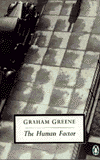 My ambition after the war was to write a
novel of espionage free from the conventional violence,
which has not, in spite of James
Bond, been a feature of
the British Secret Service. I wanted to present the
Service unromantically as a way of life, men going daily
to their office to earn their pensions, the background
much like that of any other profession — whether the
bank clerk or the business director — an undangerous
routine, and within each character the more important
private life. When I had spent a few years in the Service
during the war, first in West Africa and then in London,
I had certainly found little excitement or melodrama
coming my way.
My ambition after the war was to write a
novel of espionage free from the conventional violence,
which has not, in spite of James
Bond, been a feature of
the British Secret Service. I wanted to present the
Service unromantically as a way of life, men going daily
to their office to earn their pensions, the background
much like that of any other profession — whether the
bank clerk or the business director — an undangerous
routine, and within each character the more important
private life. When I had spent a few years in the Service
during the war, first in West Africa and then in London,
I had certainly found little excitement or melodrama
coming my way.
…I began The Human Factor more than ten years before it was published and abandoned it in despair after two or three years' work…I abandoned it mainly because of the Philby affair. My double agent Maurice Castle bore no resemblance in character or motive to Philby, none of the characters has the least likeness to anyone I have know, but I disliked the idea of the novel being taken as a roman a clef. I know very well from experience that it is only possible for me to base a very minor and transient character on a real person. A real person stands in the way of imagination. Perhaps a trick of speech, a physical trait may be used, but I can write no more than a few pages before realizing that I simply don't know enough about the character to use him, even if he is an old friend. With the imaginary character I am sure — I know that Doctor Percival in The Human Factor admires the painting of Ben Nicholson, I know that Colonel Daintry will open a tin of sardines when he returns from the funeral of his colleague.
 …I sent a copy of the book to Moscow,
to my friend Kim Philby, and his reply interested me. His
criticism was valid. I had made Castle's circumstances in
Moscow, he wrote, too bleak. He himself had found
everything provided for him, even to a shoehorn,
something he had never possessed before.
…I sent a copy of the book to Moscow,
to my friend Kim Philby, and his reply interested me. His
criticism was valid. I had made Castle's circumstances in
Moscow, he wrote, too bleak. He himself had found
everything provided for him, even to a shoehorn,
something he had never possessed before.
from Ways of Escape, pp.255-258
© Melody Yiu
Email me: greeneland -at- gmail . com
Images and quoted text on this website may be protected by U.S. and international copyright laws. They are presented here for academic interest and personal entertainment. No distribution, reproduction, re-transmission or other rights are given or implied by their appearance. If you have any copyright concerns, please notify me.